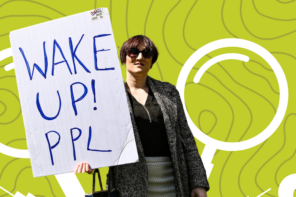Running the gamut from religious fundamentalists to closet atheists, reality TV scandal to serious theological debate, here are the most popular posts from RD in 2015.
#10
Churches Can No Longer Hide the Truth: Daniel Dennett on the New Transparency
A sea change in religious doctrine and practice is on the way, says Daniel Dennett in this compelling interview with RD associate editor Andrew Aghapour. Dennett discusses his book Caught in the Pulpit: Leaving Belief Behind, which documents the experiences of preachers and rabbis who have lost their faith but must closet their newfound skepticism to preserve their careers and communities. In his view, “atheist clergy are not simply tragic figures, they are harbingers of great things to come.” The “new world of universal transparency” that has been created in the digital information age certainly poses a new set of challenges to religious institutions, and Dennett offers his predictions as to how religions will fare in the future.
#9
Fighting Fire with Ire: 3 Lessons from Noam Chomsky’s Takedown of Sam Harris
In May, New Atheist Sam Harris launched an offensive against Noam Chomsky, and Chomsky refused to just be polite. Internet drama ensued. We’re only at the second entry in our list and already, Andrew Aghapour makes his second appearance with this handy list of takeaways from the email battle of wits.
#8
Jesus Went to Hell, But Nobody Wants to Talk About It
We can always rely on Ed Simon to give us the real story behind our most revered holidays and traditions, and this Holy Week posting was no exception. The relative silence around Jesus’ “harrowing” of Hell becomes a revealing jumping-off point for a discussion of all those things that are just weird about Christianity. “As a faith,” writes Simon, “Christianity has always been defined by its paradoxes: God can become a man, God can die, God can be one and three at the same time, the King of Heaven can spend a day in Hell. If anything the heresies of the patristic era—Arianism, Monophysitism, Nestorianism and so on—are attempts to make Christianity more rational. It’s a fascinating aspect of Christianity that often the heretics are the more sober and rational ones while orthodoxy embraces enigma.”
#7
25 Things You Can Blame Muslims For
How to cope when political pundits and the mainstream media just won’t stop blaming everything on Muslims? Having a sense of humor helps. Among Haroon Moghul’s list of things you can blame Muslims for are algebra (“For every time you’ve had to solve for x, a Muslim has duped you”) and FOX News (“Because what else would they talk about?”).
#6
Why it (Still) Makes Little Sense to Call ISIS Islamic
“Is ISIS Islamic?” was one of 2015’s biggest questions, and all signs point to much more discussion about the topic for some time to come. One can only hope that the continued conversation will be as instructive and nuanced as this response by Haroon Moghul.
ISIS does claim it’s reproducing the norms of the Prophetic tradition, as Muslims are meant to, but the argument is made in bad faith. It would be like pretending to live as the early Christians did based primarily on the belief that Jews are to be collectively blamed for the death of Christ, while ignoring everything the Bible says about mercy, justice, peace, generosity, and the proper treatment of the Other. The slavery described in Callimachi’s article, and from other, harrowing reporting about ISIS, is utterly foreign to the Prophetic tradition; that, and their other behaviors, which are profoundly selective, ripped from their context, ignoring the numerous instances in which the Prophet Muhammad preferred mercy, amnesty and forgiveness over force (though Muhammad did use force, and at times that use of force shocks).
#5
Josh Duggar and the Purity Lie
The downfall of the Duggar family, of reality TV fame, was among the most notorious sources of Schadenfreude this year. Sarah Posner goes beyond the gossip and muckraking in this post about the family’s cover-up of Josh Duggar’s sexual predation.
#4
Why Tony Campolo’s LGBTQ Reversal is Evangelicalism’s Tipping Point
“A few years ago,” writes Cathleen Falsani, “when a few progeny of preachers from Campolo and Graham’s generation began to speak out in favor of LGBTQ inclusion, I wondered aloud whether American evangelicals were on the cusp of a ‘great gay awakening.’ Then, as now, I think the answer is, clearly, yes.”
#3
Is Monsanto Satan? The Pleasure and Problem of Conspiracy Theory
After Alan Levinovitz’s book The Gluten Lie: And Other Myths About What You Eat was published this year, many of his critics accused him of being paid by Monsanto, the third most hated company in America:
I knew Monsanto sues farmers into oblivion, caused a rash of suicides in India, suppresses negative media coverage, and pays politicians, and scientists to lie on its behalf.
But there was one story I didn’t believe, because I knew it wasn’t true: Monsanto hadn’t paid me. So I did what any academic or journalist would do, and started learning more about the company that supposedly had me on its payroll.
#2
Confront Death by Avoiding Fritos: The Gluten Lie, Fad Diets, & Foodie Faith
Turns out we’re definitely obsessed with food and figuring out why we eat what we eat (or why we don’t eat what we don’t…) Michael Schulson’s interview with Alan Levinovitz revealed how gluten-free and other fad diets have come to replace religious beliefs for many. They promise a longer, fuller existence as well as a reason to think ourselves better than other people. “It’s funny,” says Levinovitz, “people are trying to debunk these fad diets with scientific evidence, but what they’re not realizing is that really these beliefs aren’t scientific at all. They’re wrapped in scientific rhetoric, but ultimately they’re quasi-religious beliefs that are based on superstition and myth.” (Watch for Michael’s interview with S. Boyd Eaton, one of the founders of the Paleo diet, coming to RD in early 2016.)
#1
An Open Letter To American Muslims on Same-Sex Marriage
Addressed to “Our Fellow American Muslims,” this letter was penned by Reza Aslan and Hasan Minhaj shortly after the US Supreme Court’s decision to legalize gay marriage in all fifty states. It’s a fine example of how RD’s writers continue to stay ahead of the curve in prompting these needed conversations, and is our top post of 2015.
You may think LGBT rights is a new conversation, something that’s only recently come into contact with modern Islamic thought, but trust us, it’s not. Challenging the status quo for the betterment of society is one of the very foundations on which Islam was built.
No one is asking you to change your beliefs. If you feel your faith tells you that homosexuality is haram, fine. We disagree with your interpretation, but you’re entitled to it.
Ain’t America grand?
But if you can’t find it in your heart to accept gays on principle, think about the country you want to live in. After all, the constitution that just ensured the rights of LGBT communities is the same constitution that protects our mosques and community centers, that keeps our Islamic schools open, that allows us equal rights and privileges in the face of overwhelming hatred and bigotry from our fellow Americans. You can’t celebrate one without the other.
That’s why it’s not enough to simply “tolerate” the Supreme Court decision. Tolerating another community only stirs up concealed fear toward the marginalized and apathy toward the political process. As minorities we don’t have the luxury to have either of those emotions. We have to do more than tolerate. We have to embrace. We have to fight for the right of others to live their lives as freely as we want to live ours.






